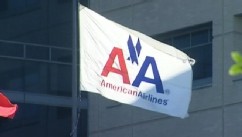American Airlines and US Airways announced Thursday they will merge their operations and become one airline, called American Airlines. Together, they are the world's largest airlines by passenger traffic.
The new airline will be led by US Airways CEO Doug Parker, while AMR Corp.'s Tom Horton will serve as Chairman of the combined airline's Board of Directors through its first annual meeting of shareholders. Parker will assume the additional position of Chairman of the Board after the first annual meeting of shareholders.
The new American Airlines will be headquartered in Dallas-Fort Worth.
What does the merger mean for travelers? In the short term, little will change on day-to-day business. Longer term will likely be a different story.
Short term changes:
In the short-term, travelers will see virtually no changes from either airline. The merger still faces regulatory obstacles and must be approved by the Department of Transportation and the Justice Department. If and when it passes that scrutiny, the process of merging the two airlines' operations will begin.
If you're holding a ticket on US Airways or American Airlines, that ticket will still be valid on the airline you planned to fly, on the day and time you planned to fly it.
When you get to the airport, you will head to the same airline check-in counter by which your ticket was issued.
American Airlines, US Airways to Make Merger Official Watch Video
The only possible exception is if you are holding a ticket for many months out and your airline's schedule changes as a result of the merger of flight schedules. In this case, you will be contacted by the airline ahead of time, typically to the email address you provided when the ticket was purchased.
Members of either airline's frequent flier programs need not worry: Your miles are still valid on your airline and it's very unlikely you'll lose miles or elite status. American and US Air will merge frequent flier programs. The new American Airlines will be part of the oneworld Alliance. US Airways will leave the Star Alliance.
Long term changes:
Longer term, the merger could mean higher prices. The U.S., in the last decade, has gone from six legacy carriers (Delta, Northwest, United, Continental, American and US Air) to four (Delta, United, American and US Airways).
If this merger is approved, just three legacy carriers will remain.
Certainly, the higher fares can't all be attributed to consolidation in the industry (fuel costs, a reduction in available seats and the economy all factor in) but in general, less competition means higher prices.
Higher airfare tends to hit smaller cities harder than larger cities, again, because smaller cities and airports have less competition.
On the up side, the merger will also mean more destinations for the new American Airlines. US Airways passengers will benefit from American's international routes, particularly in Europe and Latin America. American will be able to access the smaller U.S. cities where US Airways has a large presence. So for example, a US Airways flier who travels abroad from time to time will now be able to earn meaningful miles on those trips.
American Airlines has hubs and or a significant presence in Dallas/Fort Worth, Chicago, New York, Miami and Los Angeles while US Airways has key operations in Phoenix, Philadelphia and Charlotte, N.C. A merger may force the new airline to reduce operations at one or more of these hubs.
And while passengers shouldn't expect bag fees to go away, it seems that the new American Airlines has no plans to charge for carry-on bags, like Spirit Airlines. When asked by ABC News if the new American Airlines had plans to charge for carry-ons, Parker laughed and said, "We do not."
Additional reporting by ABC News' Matt Hosford.

No comments:
Post a Comment